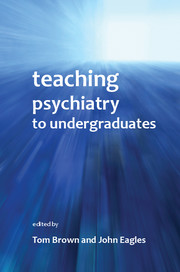Book contents
- Frontmatter
- Contents
- List of figures, tables and boxes
- List of contributors
- Preface
- Foreword
- 1 How do students learn?
- 2 Recent developments in undergraduate medical education
- 3 Undergraduate psychiatry teaching – the core curriculum
- 4 The organisation of undergraduate teaching
- 5 Assessment of undergraduates in psychiatry
- 6 Using computers to teach undergraduate psychiatry
- 7 How to give a lecture
- 8 How to do small-group teaching
- 9 Problem-based learning
- 10 Teaching trainee psychiatrists how to teach medical students: the Southampton model
- 11 Involving trainees in teaching
- 12 Involvement of service users in psychiatric education
- 13 Time-efficient clinical teaching
- 14 Intercalated degrees
- 15 Undergraduate experiences of psychiatry: a student view
- 16 Integration: teaching psychiatry with other specialties
- 17 Teaching the teachers in a cross-cultural setting: the Scotland–Malawi Mental Health Education Project
- 18 International undergraduate teaching
- 19 Teaching with simulated patients and role-play
- 20 Undergraduate medical education and recruitment to psychiatry
- 21 Choosing psychiatry: factors influencing career choice among foundation doctors in Scotland
- 22 Funding of the teaching of medical undergraduates
- 23 Dealing with students in difficulty
- 24 Training medical students to promote good mental health in secondary schools
- 25 Women in medicine
- Index
Preface
Published online by Cambridge University Press: 02 January 2018
- Frontmatter
- Contents
- List of figures, tables and boxes
- List of contributors
- Preface
- Foreword
- 1 How do students learn?
- 2 Recent developments in undergraduate medical education
- 3 Undergraduate psychiatry teaching – the core curriculum
- 4 The organisation of undergraduate teaching
- 5 Assessment of undergraduates in psychiatry
- 6 Using computers to teach undergraduate psychiatry
- 7 How to give a lecture
- 8 How to do small-group teaching
- 9 Problem-based learning
- 10 Teaching trainee psychiatrists how to teach medical students: the Southampton model
- 11 Involving trainees in teaching
- 12 Involvement of service users in psychiatric education
- 13 Time-efficient clinical teaching
- 14 Intercalated degrees
- 15 Undergraduate experiences of psychiatry: a student view
- 16 Integration: teaching psychiatry with other specialties
- 17 Teaching the teachers in a cross-cultural setting: the Scotland–Malawi Mental Health Education Project
- 18 International undergraduate teaching
- 19 Teaching with simulated patients and role-play
- 20 Undergraduate medical education and recruitment to psychiatry
- 21 Choosing psychiatry: factors influencing career choice among foundation doctors in Scotland
- 22 Funding of the teaching of medical undergraduates
- 23 Dealing with students in difficulty
- 24 Training medical students to promote good mental health in secondary schools
- 25 Women in medicine
- Index
Summary
In 2003, concern about recruitment into the specialty led to a survey of psychiatrists working in Scotland. Respondents highlighted the link between the quality of undergraduate teaching and the choice of young doctors to pursue a career in psychiatry. Accordingly, the Royal College of Psychiatrists’ Scottish Division Undergraduate Student Teaching and Recruitment Group (S-DUSTARG) was constituted. The main aims of the group have been to raise the profile of and enhance the quality of student teaching and, through this and other methods, to increase the numbers of medical graduates entering psychiatry.
The purpose of this book is to further those aims. In particular, we are aware that trainee psychiatrists (just like their senior colleagues) generally receive little in the way of guidance or direction when they undertake student teaching. The earlier chapters address some of the theory and practical aspects of teaching psychiatry to medical students. The later chapters focus more on issues relating to recruitment. We believe that recruiting adequate numbers of the brightest young doctors into psychiatry is a priority if we wish to ensure the longer-term health and credibility of our profession.
As our own interest in this has developed, we have become aware of the work of like-minded colleagues around the country, many of whom have contributed to this book. We thank all of our contributors, but we are even more grateful to Karen Addie, Policy Manager in the Scottish Division of the Royal College of Psychiatrists, for her industry and patience throughout the various stages in the production of this book. Thanks are also due to Lana Hadden for her assistance.
- Type
- Chapter
- Information
- Publisher: Royal College of PsychiatristsPrint publication year: 2011

